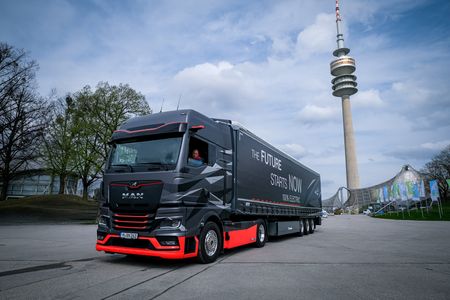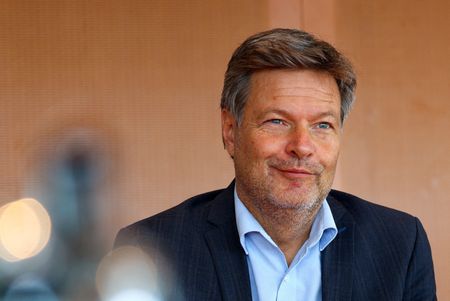By Riham Alkousaa
BERLIN (Reuters) -The German government on Wednesday launched a project to build a nationwide fast-charging network for heavy-duty vehicles as Berlin aims to decarbonize the transport sector by 2045.
Greenhouse emissions in Europe’s biggest economy fell to the lowest level in 70 years in 2023, but the transport sector has consistently failed to meet its climate targets.
Germany aims for about a third of its heavy road haulage to be powered by electricity or run on electrically produced fuels such as synthetic methane or hydrogen by 2030.
According to federal road traffic authority KBA, electric vehicles made up just 2.1% of Germany’s commercial truck fleet as of April.
The initiative, dubbed “Power to the Road”, aims to create a network of 350 fast-charging sites covering about 95% of Germany’s federal highways. The country is also pushing to expand its electricity grid to absorb more renewable energy.
“Our goal is to let trucks only run on green electricity,” Economy Minister Robert Habeck said in a statement on Wednesday.
Public tenders for some 130 planned locations will take place in the late summer, the economy and transport ministries said in a joint statement.
“A powerful charging infrastructure forms the backbone of tomorrow’s climate-friendly mobility and logistics. With the truck fast-charging network, we are launching a real mammoth project,” Transport Minister Volker Wissing said.
Commercial vehicles account for around a third of Germany’s transport sector greenhouse gas emissions as heavy long-distance road haulage has been almost exclusively powered by diesel, data by Germany’s Environment Agency (UBA) published in March showed.
Trucks’ carbon dioxide emissions per kilometre have dropped by almost by 8.4% since 1995 as engines became more efficient, but a rise in freight transport has boosted total CO2 emissions in the sector by 21%.
The transport ministry said EU rules requiring most new heavy-duty vehicles to be emissions-free from 2040 would push truck manufacturers to make cleaner trucks in the future.
“The market readiness of the battery truck is well advanced,” a spokesperson for the ministry said.
Urs Maier, an expert at think-tank Agora Verkehrswende, said large battery-electric semi-trailer tractors have only recently become available.
“However, as with smaller trucks, rapid growth in sales figures can be expected in this segment too,” Maier said.
Although large electric trucks cost more than twice as much as diesel-powered equivalents, the total cost per km is lower, Maier said.
They require only a third of energy and are exempt from road tolls which will accelerate their adoption in the market, he added.
(Reporting by Riham Alkousaa; Editing by Jan Harvey and Ludwig Burger)












